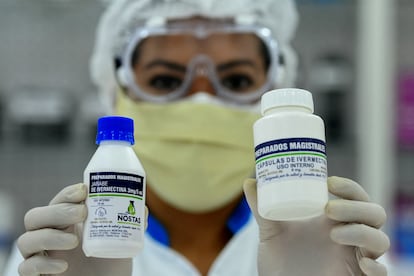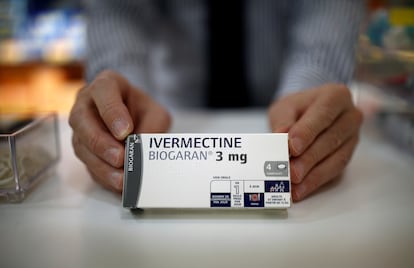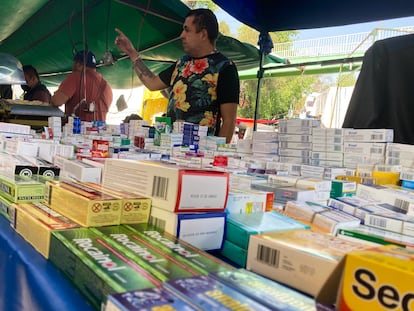Ivermectin’s bumpy ride through America
Doctors in many countries on the continent have spent the pandemic writing prescriptions for the antiparasitic drug to fight Covid-19, despite widespread doubts in the scientific community over its use

The use of ivermectin against Covid-19 has been controversial around the world, fuelled by social media and celebrity proponents. Nominally an antiparasitic, the World Health Organization (WHO) advised against its use a few months after the outbreak of the pandemic in 2020, and noted that more studies were needed to evaluate its effectiveness against the novel coronavirus. The US Food and Drug Administration (FDA) and the European Medicines Agency have followed the WHO’s line, but at least 10 Latin American countries authorized its use during the pandemic.
Japanese biochemist Satoshi Omura won the 2015 Nobel Prize in Medicine for the discovery of ivermectin three decades earlier. The drug is highly effective against infections caused by worms and is commonly used as a topical solution to treat head lice. In the first few months of the pandemic, the world was desperately fighting against the then-unknown SARS-CoV-2, with no vaccines or treatments to turn to as the virus infected and killed thousands of people every day. Pharmaceutical companies and governments desperately searched for existing drugs that might work, and the low-cost ivermectin emerged as a potential option.
Most academics and international agencies did not jump on the bandwagon due to the lack of irrefutable evidence in the drug’s favor during the early days of the pandemic. At the extremes, ivermectin was variously seen as a “miracle drug” or completely useless against Covid-19. The United States has simultaneously become a bastion of skepticism about its use against the virus as well as a breeding ground for celebrity and social media promotion of the antiparasitic. “You are not a horse. You are not a cow. Seriously, y’all. Stop it,” one FDA tweet read, alluding to ivermectin’s veterinary use in a bid to curb its consumption. Before the pandemic, doctors were handing out 3,600 prescriptions for human use each week. Six months ago, the figure was 88,000, according to the US Centers for Disease Control and Prevention (CDC), which has warned of a sudden increase in demand.
In addition to the FDA, the National Institutes of Health, the American Medical Association and US pharmaceutical associations all advise against prescribing ivermectin for Covid, but that has not stopped vaccine skeptics taking it – with sometimes disastrous consequences. Last August, five people in Oregon were hospitalized for ivermectin poisoning, two of whom required intensive care.
“Ivermectin use has been irrational in many countries,” said biologist, chemist and pharmacologist Guillermo Barranco, an academic at the National Autonomous University of Mexico (UNAM). Barranco believes the drug has been misprescribed in terms of dose, which has led to unnecessary expense and demand for counterfeits. “Prescribing a drug is not easy,” he added. “It is not just a matter of saying ‘take it and that’s it.’ You need trained professionals.”
Brazil may offer the most pertinent example of ivermectin use and abuse in Latin America. The government of Jair Bolsonaro continues to defend using the drug against Covid-19, despite the raft of scientific evidence on its ineffectiveness and amid the deaths of 600,000 Brazilians from Covid-19. The issue remains highly politicized, and to this day the Brazilian Ministry of Health recommends so-called Covid kits, which include ivermectin and other discredited drugs such as chloroquine and azithromycin. Sales of ivermectin increased eightfold in the country during the first year of the pandemic.

In Peru, ivermectin has been authorized for the treatment of mild cases of Covid-19 since May 2020. Then-health minister Victor Zamora declared that one drop of the solution should be taken for every kilo the patient weighed, up to a maximum of 50 drops. Peru’s public health system also provided free “Covid kits” with the same medicines as in Brazil. Faced with the collapse of the country’s health system, thousands of people self-medicated with ivermectin in 2020, after doctors and dubious “experts” recommended it on radio programs. Some 5,000 people also took stronger doses intended for veterinary use, at the behest of evangelical groups.
Local media has reported that the Peruvian government bought 1,000% more ivermectin in 2020 than in previous years, and the official policy has ebbed and flowed as health officials rotated in and out. In February 2021, another former health minister, Pilar Mazzeti, commented there were “no definitive results” on the drug’s effects, but that doctors could “consider its use” after talking with a patient. The following month, the newly appointed (and current) Health Minister Óscar Ugarte cited the WHO in saying that studies of the antiparasitic drug “show that it does not have the positive effect it was supposed to have.” Health authorities withdrew ivermectin from its list of approved Covid-19 treatments in May 2021, but that does not mean that citizens have stopped taking it.
In line with its neighbors, Bolivia included ivermectin in its list of essential drug treatments against Covid-19 in May 2020, even though the government acknowledged that no scientific study confirmed its efficacy. The drug had become popular, especially in the east of the country, where it had long been used to combat parasites in animals and people. Its popularity has waned over time, as more and more people died despite being treated with the drug, while some doctors have warned of an increase in cases of poisoning, although there are no official statistics. As in most other countries on the continent, ivermectin’s use has also slowed since the rollout of vaccines. The latest Health Ministry guidelines in Bolivia do not recommend it directly, but several municipalities still distribute it free of charge and its use is still widespread among conspiracy theorists and vaccine skeptics.
Some smaller Latin American countries made very ambitious bets on the drug. Guatemala also handed it out in medical kits for the population at the end of 2020, along with ibuprofen, aspirin and vitamins C and D. “Be warned that there are veterinary drugs on the market containing ivermectin,” the authorities said at the time. “These are not authorized for human use because of the imminent risk they can cause to health.” Without adequate medical supervision, ivermectin can cause nausea, vomiting, diarrhea, drops in blood pressure, allergic reactions, seizures, coma and even death, according to the FDA. Belize also authorized the antiparasitic’s use to treat Covid-19, including in severe cases, from December 2020 onwards. “It is a drug that has been used safely in humans and animals for many years,” explained Melissa Diaz-Musa, the country’s health minister, noting that the risks outweighed the benefits. “We found significant evidence that it helps reduce the replication of the virus,” she added to justify the decision and challenge the narrative that it was a so-called “miracle product.”
Panama went a step further and purchased around 450,000 doses of ivermectin in the first months of 2020, along with 2.9 million doses of hydroxychloroquine, as part of the now familiar self-medication kits, according to Nature magazine. The country later backtracked, and in December 2021 the government issued a communiqué advising citizens not to use the drugs to treat Covid-19: “The efficacy of these products against this virus has not been proven,” the statement said.
In Mexico, a dozen states and the federal district of the capital administered ivermectin, and it was an omnipresent drug in private doctors’ offices (and of some public sector doctors). “Everyone was prescribing it,” said Salvador Arteaga, a doctor in Mexico City, but added: “Many of us stopped handing it out because we saw no effects on our patients, especially in the severe cases.” The government of President Andrés Manuel López Obrador issued an order in August 2021 not to use ivermectin, and Mexico City authorities stopped distributing it, although they have defended their initial decision.

In some countries, there are inconsistencies between national policy on the use of ivermectin and the strategy of some regional states. Ecuador has banned its use for Covid-19 treatment since February last year, but Cynthia Viteri, mayor of Guayaquil (the second most populated city in the country), became the main proponent of its use in 2021, when vaccines were still largely yet to arrive.
In Colombia, authorities have never officially recommended the use of ivermectin to treat Covid-19. As early as July 2020, President Iván Duque, who at the time had a daily television broadcast to report on the pandemic, asked the public to proceed with caution. “The Ministry of Health and Social Protection considers that in order to guarantee the effectiveness of the drug, we must wait for the results of controlled studies,” he said. That same summer, the mayor of Cali, physician Jorge Iván Ospina, defended its use, which became popular in what is the third-largest city in the country.
Ivermectin also found an ally in former Colombian president Álvaro Uribe, one of the country’s most powerful men. Uribe said publicly that he had taken it to overcome the coronavirus on the advice of his doctors, in a cocktail that also included azithromycin, acetaminophen, vitamin C and plant extracts. In June 2021, the Colombian authorities issued an alert, reporting an increase in poisoning from consuming the antiparasitic.
In Argentina, the National Administration of Food, Drugs and Medical Technology (Anmat) also declined to recommend ivermectin as a Covid-19 treatment. The medicine approval body argues that there is insufficient evidence to validate its efficacy against the virus. The drug is not available in pharmacies in big cities such as Buenos Aires, Córdoba, Rosario and Mendoza, and doctors will not prescribe it. Anti-vaccine demonstrators pushing for its use are also markedly absent.
Nevertheless, clinical trials have been authorized in Argentina, and the Argentine Scientific Commission found that “the administration of ivermectin at a dose of 0.6 milligrams per kilogram of bodyweight produces the fastest and deepest elimination of the virus when treatment is started in early stages.” However, it warned that this trial was not sufficiently representative and recommended further research. The drug remained banned by the national authorities after this result, but four of the country’s 23 provinces –Misiones, Corrientes, Tucumán and La Pampa – authorized its use in infected people and health personnel. Although certain European and Asian countries have granted partial authorizations and conducted ivermectin studies, the Americas have established themselves as one of the epicenters of hopes, failures and scandals over the use of ivermectin against the coronavirus.
Tu suscripción se está usando en otro dispositivo
¿Quieres añadir otro usuario a tu suscripción?
Si continúas leyendo en este dispositivo, no se podrá leer en el otro.
FlechaTu suscripción se está usando en otro dispositivo y solo puedes acceder a EL PAÍS desde un dispositivo a la vez.
Si quieres compartir tu cuenta, cambia tu suscripción a la modalidad Premium, así podrás añadir otro usuario. Cada uno accederá con su propia cuenta de email, lo que os permitirá personalizar vuestra experiencia en EL PAÍS.
¿Tienes una suscripción de empresa? Accede aquí para contratar más cuentas.
En el caso de no saber quién está usando tu cuenta, te recomendamos cambiar tu contraseña aquí.
Si decides continuar compartiendo tu cuenta, este mensaje se mostrará en tu dispositivo y en el de la otra persona que está usando tu cuenta de forma indefinida, afectando a tu experiencia de lectura. Puedes consultar aquí los términos y condiciones de la suscripción digital.








































